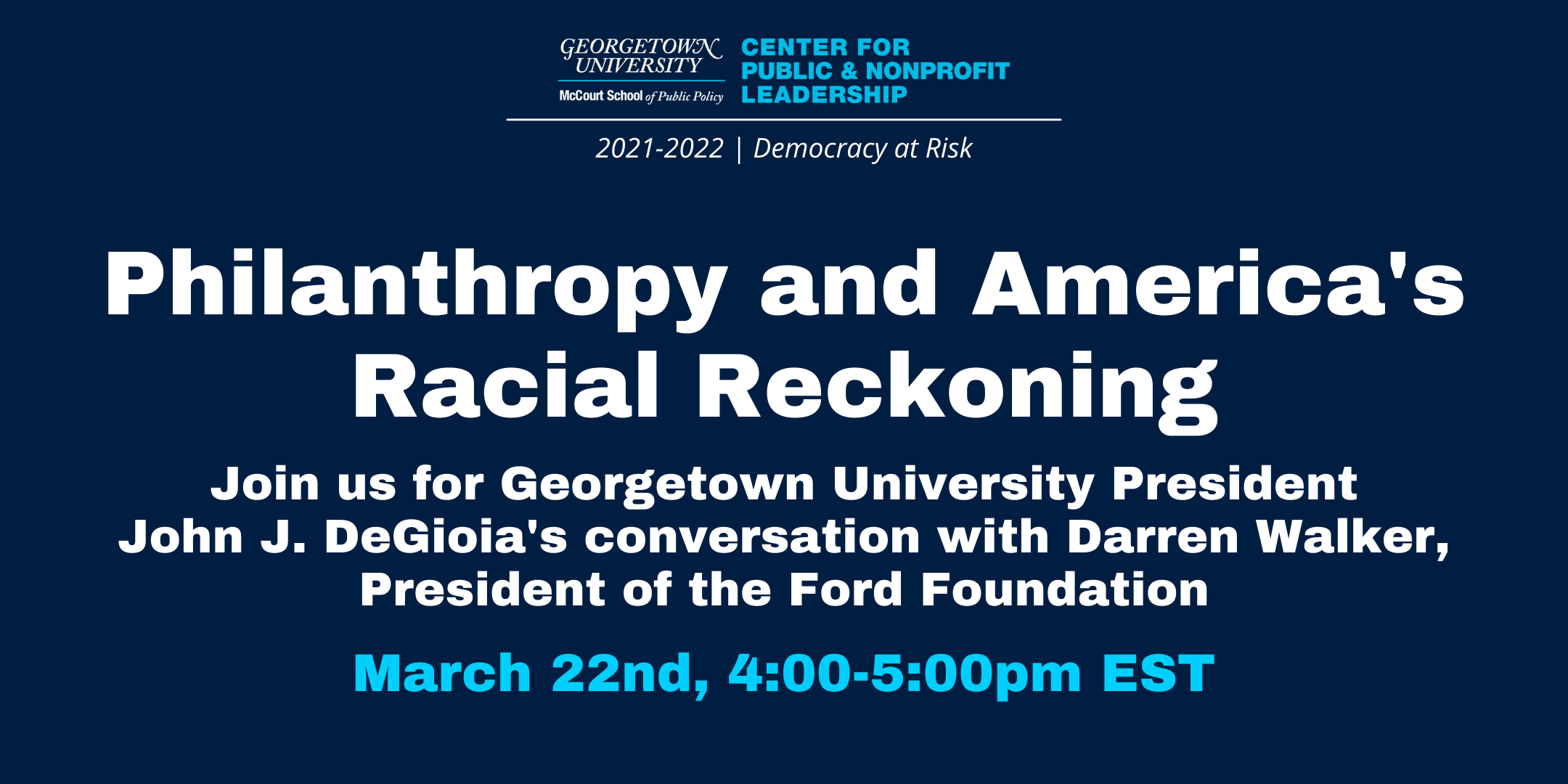Philanthropy and America’s Racial Reckoning

Posted in News Story
On March 22nd, 2022, the Center for Public and Nonprofit Leadership hosted a conversation between Darren Walker, President of the Ford Foundation and John J. DeGioia, President of Georgetown University. The event titled, “Philanthropy and America’s Racial Reckoning,” is part of a year-long speaker series which the Center is hosting in celebration of its 25th Anniversary.
In his opening remarks, President DiGioia acknowledged, “For a quarter century now, the Center has worked to strengthen and further our understanding of how nonprofits can impact inequality and injustice through signature programs like the Nonprofit Management Executive Certificate.” This event furthers the Center’s work to build the leadership of the nonprofit and philanthropic sectors.
During the conversation, Darren Walker focused on three central themes: understanding the history of philanthropy, the threat of inequality to a strong democracy, and that everyone must be engaged in order to change our organizations, our communities and our nation.
The History of American Philanthropy
Walker took us back to the roots of American philanthropy and the role historical American philanthropists like Andrew Carnegie had in establishing “the tents of modern philanthropy.” Walker quoted a sermon from 1963 where Dr. King challenges the objectives of philanthropy. Stating that while “philanthropy is commendable, it should not allow the philanthropist to overlook the economic injustice which makes philanthropy necessary. It is not enough to simply overlook many of the problems that you are implicated in. You must interrogate your complicity in some of the very problems you seek to solve.”
The Threat Inequality and Injustice Poses to Our Democracy
Walker explained how the Ford Foundation has addressed democracy in its mission. “This idea of strengthening democracy for me became a touchstone… The work I wanted us to do was ask ourselves, what is in the way?… The growing inequality in America is a threat to the fabric of our democracy. If we want to achieve a stronger democracy, we must address issues of inequality because of the correlation between growing inequality and growing hopelessness in our society. The oxygen of democracy is hope. Inequality undermined that. Inequality asphyxiates hope.”
What Individuals Can Do
Walker reminds the audience that meaningful change begins at the very top. “It starts with the board and the president. … If change is to happen and to stick, you’ve got to have the model of what you want it to look like be demonstrated visibly, viscerally, and publicly.” He ends with a call to action to the audience, “everyone should be motivated to understand that we need all of us to be engaged in this enterprise called the American experiment. We need to be civically engaged; we need to be politically engaged. The call to action to all of us is we cannot give up on our democracy.” He reminds the audience the role that they must play within their communities as well. “We are not helpless; we are not hopeless; we are not without any resilience or agency. So, we must ask ourselves, what are the things happening in our community where we have an obligation and accountability?”
Dr. Kathy Kretman closed the event saying, “It’s easier said than done to have frank conversations about racism—personal, institutional, systemic—but we don’t know where to begin. Mr. Walker, through your own story, you’ve shown us that humility, moral courage, and the willingness to recognize privilege and positions are essential. Seeking out and listening to those who have experienced injustice are critical.”
We recommend the following resources related to the topics discussed at the event:
- Philanthropy’s Necessary Role in Advancing an Inclusive, Multiracial Democracy.
- Beyond Window Dressing: A Call for Reform of Private Foundations to Address the Race-based Wealth Gap
- From Generosity to Justice: A New Gospel of Wealth.
Philanthropy and America’s Racial Reckoning is part of our year-long “Democracy at Risk” series of conversations, which we are hosting in celebration of the 25th Anniversary of the Center for Public and Nonprofit Leadership. These discussions will inform the next 25 years of the Center’s work with nonprofit, philanthropic and public sector leaders to strengthen our communities, nation and world.
